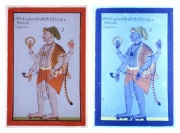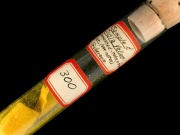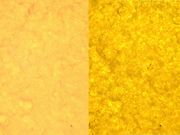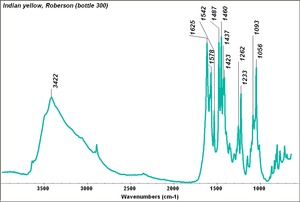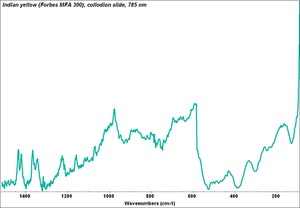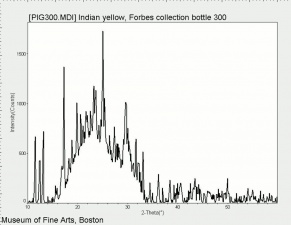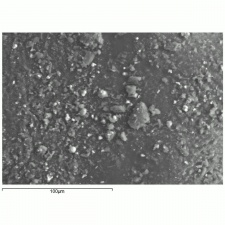Difference between revisions of "Indian yellow"
(username removed) |
|||
| (8 intermediate revisions by 5 users not shown) | |||
| Line 1: | Line 1: | ||
[[File:UV fluorescence Indian paper.jpg|thumb|Indian yellow under Ultraviolet fluorescence]] | [[File:UV fluorescence Indian paper.jpg|thumb|Indian yellow under Ultraviolet fluorescence]] | ||
== Description == | == Description == | ||
| − | |||
| − | |||
| − | |||
[[File:300 Indian yellow.jpg|thumb|Indian yellow]] | [[File:300 Indian yellow.jpg|thumb|Indian yellow]] | ||
| + | A yellow organic pigment produced in India from the 15th to the 20th century. Indian yellow is composed of magnesium euxanthate. It was originally made from the urine of cows fed exclusively on mango leaves (''Mangifera indica Linn.''). The washed, powdered material is a clear, golden yellow color that was popular for watercolor and tempera paints. Because the pigment was expensive, it was often adulterated with inorganic yellows, such as [[lead chromate]]. The production of Indian yellow was prohibited in 1908 because the mango leaves were harmful to the cattle. Current commercial paints labeled Indian yellow contain a synthetic coal-tar derivative that is more permanent than the original colorant. Authentic Indian yellow fluoresces a bright yellow color when lit with long wavelength ultraviolet light. | ||
| + | [[File:Indianyellow C100x.jpg|thumb|Indian yellow at 100x (visible light left; UV light right)]] | ||
== Synonyms and Related Terms == | == Synonyms and Related Terms == | ||
| − | magnesium euxanthate; CI 75320; Indischgelb (Deut.); jaune indien (Fr.); Indiko kitrino (Gr.); giallo indiano (It.); giallo euxantato (It.); amarillo indio (Esp.); Indisch geel (Ned.); | + | magnesium euxanthate; CI 75320; Indischgelb (Deut.); jaune indien (Fr.); Indiko kitrino (Gr.); giallo indiano (It.); giallo euxantato (It.); amarillo indio (Esp.); Indisch geel (Ned.); purrée (Ind.); purree; piuri; peori; pioury; purrea Arabica; Hardwari peori; peri rung; peoli; Monghyr puri; gogili; gaugoli; amarillo Indian; snowshoe yellow |
| − | |||
| − | |||
| − | |||
| − | |||
| − | |||
| − | |||
| − | |||
| − | |||
| − | |||
| − | |||
| − | + | [[[SliderGallery rightalign|Indian yellow 300.TIF~FTIR (MFA)|Indian yellow (Forbes MFA 300), collodion slide, 785 nm resize.tif~Raman (MFA)|PIG300.jpg~XRD|f300sem.jpg~SEM|f300edsbw.jpg~EDS]]] | |
| − | | | ||
| − | |||
| − | | | ||
| − | |||
| − | |||
| − | |||
| − | |||
| − | == | + | ==Physical and Chemical Properties== |
| − | + | * Soluble in water, dilute acids, ether, alcohol. Not lightfast in alkali. | |
| + | * The original Indian yellow leaves a small amount of white ash when burned that is soluble in hydrochloric acid. Indian yellow that has been adulterated with an inorganic yellow will leave greater amounts of ash and it will be insoluble. | ||
| + | * Low birefringence. | ||
| + | * Fluoresces brightly in long wavelength UV. | ||
| + | * Composition = C19H16O11Mg.5H2O | ||
| + | * Refractive Index = 1.67 | ||
== Additional Images == | == Additional Images == | ||
<gallery> | <gallery> | ||
| − | + | File:10_Indian_yellow_200X.jpg|Indian yellow at 200x transmitted light | |
| − | File:10_Indian_yellow_200X.jpg|Indian yellow | + | File:10_Indian_yellow_200X_pol.jpg|Indian yellow at 200x polarized light |
| − | File:10_Indian_yellow_200X_pol.jpg|Indian yellow | ||
</gallery> | </gallery> | ||
| − | + | ==Resources and Citations== | |
| − | == | + | * N.S.Baer, A. Joel, R.L.Feller, N.Indictor, "Indian Yellow", ''Artists Pigments'', Vol. 1, R.L. Feller, ed., Cambridge University Press:Cambridge, 1986. |
* ''The Dictionary of Art'', Grove's Dictionaries Inc., New York, 1996 Comment: 'Pigments' | * ''The Dictionary of Art'', Grove's Dictionaries Inc., New York, 1996 Comment: 'Pigments' | ||
| − | * | + | * R. J. Gettens, G.L. Stout, ''Painting Materials, A Short Encyclopaedia'', Dover Publications, New York, 1966 Comment: ref. index 1.67 |
| − | * | + | * Ralph Mayer, ''A Dictionary of Art Terms and Techniques'', Harper and Row Publishers, New York, 1969 (also 1945 printing) |
| − | * | + | * Hermann Kuhn, ''Conservation and Restoration of Works of Art and Antiquities'', Butterworths, London, 1986 |
| − | * | + | * R.D. Harley, ''Artists' Pigments c. 1600-1835'', Butterworth Scientific, London, 1982 |
| − | * | + | * Matt Roberts, Don Etherington, ''Bookbinding and the Conservation of Books: a Dictionary of Descriptive Terminology'', U.S. Government Printing Office, Washington DC, 1982 |
| − | * | + | * Pigments Through the Ages: http://webexhibits.org/pigments/indiv/technical/indianyellow.html |
| − | * | + | * F. Crace-Calvert, ''Dyeing and Calico Printing'', Palmer & Howe, London, 1876 Comment: p. 297 |
| − | * | + | * Book and Paper Group, ''Paper Conservation Catalog'', AIC, 1984, 1989 |
| − | * Art and Architecture Thesaurus Online, | + | * Art and Architecture Thesaurus Online, https://www.getty.edu/research/tools/vocabulary/aat/, J. Paul Getty Trust, Los Angeles, 2000 |
[[Category:Materials database]] | [[Category:Materials database]] | ||
Latest revision as of 11:20, 15 September 2022
Description
A yellow organic pigment produced in India from the 15th to the 20th century. Indian yellow is composed of magnesium euxanthate. It was originally made from the urine of cows fed exclusively on mango leaves (Mangifera indica Linn.). The washed, powdered material is a clear, golden yellow color that was popular for watercolor and tempera paints. Because the pigment was expensive, it was often adulterated with inorganic yellows, such as Lead chromate. The production of Indian yellow was prohibited in 1908 because the mango leaves were harmful to the cattle. Current commercial paints labeled Indian yellow contain a synthetic coal-tar derivative that is more permanent than the original colorant. Authentic Indian yellow fluoresces a bright yellow color when lit with long wavelength ultraviolet light.
Synonyms and Related Terms
magnesium euxanthate; CI 75320; Indischgelb (Deut.); jaune indien (Fr.); Indiko kitrino (Gr.); giallo indiano (It.); giallo euxantato (It.); amarillo indio (Esp.); Indisch geel (Ned.); purrée (Ind.); purree; piuri; peori; pioury; purrea Arabica; Hardwari peori; peri rung; peoli; Monghyr puri; gogili; gaugoli; amarillo Indian; snowshoe yellow
Physical and Chemical Properties
- Soluble in water, dilute acids, ether, alcohol. Not lightfast in alkali.
- The original Indian yellow leaves a small amount of white ash when burned that is soluble in hydrochloric acid. Indian yellow that has been adulterated with an inorganic yellow will leave greater amounts of ash and it will be insoluble.
- Low birefringence.
- Fluoresces brightly in long wavelength UV.
- Composition = C19H16O11Mg.5H2O
- Refractive Index = 1.67
Additional Images
Resources and Citations
- N.S.Baer, A. Joel, R.L.Feller, N.Indictor, "Indian Yellow", Artists Pigments, Vol. 1, R.L. Feller, ed., Cambridge University Press:Cambridge, 1986.
- The Dictionary of Art, Grove's Dictionaries Inc., New York, 1996 Comment: 'Pigments'
- R. J. Gettens, G.L. Stout, Painting Materials, A Short Encyclopaedia, Dover Publications, New York, 1966 Comment: ref. index 1.67
- Ralph Mayer, A Dictionary of Art Terms and Techniques, Harper and Row Publishers, New York, 1969 (also 1945 printing)
- Hermann Kuhn, Conservation and Restoration of Works of Art and Antiquities, Butterworths, London, 1986
- R.D. Harley, Artists' Pigments c. 1600-1835, Butterworth Scientific, London, 1982
- Matt Roberts, Don Etherington, Bookbinding and the Conservation of Books: a Dictionary of Descriptive Terminology, U.S. Government Printing Office, Washington DC, 1982
- Pigments Through the Ages: http://webexhibits.org/pigments/indiv/technical/indianyellow.html
- F. Crace-Calvert, Dyeing and Calico Printing, Palmer & Howe, London, 1876 Comment: p. 297
- Book and Paper Group, Paper Conservation Catalog, AIC, 1984, 1989
- Art and Architecture Thesaurus Online, https://www.getty.edu/research/tools/vocabulary/aat/, J. Paul Getty Trust, Los Angeles, 2000
